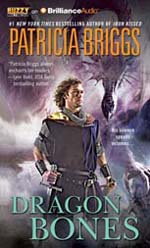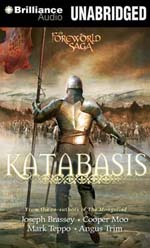
 The Beast of Calatrava: A Foreworld SideQuest
The Beast of Calatrava: A Foreworld SideQuest
By Mark Teppo; Read by Luke Daniels
Publisher: Brilliance Audio
Publication Date: 26 February 2013
[UNABRIDGED] – 4 hours
Themes: / Mongoliad / knights Templar / alternate history / fantasy / Foreworld /
Publisher summary:
After a battle left Ramiro Ibáñez de Tolosa’s face terribly disfigured, the knight of the Order of Calatrava abandoned his sword for a pastoral existence. But his beastly appearance horrifies all those who cross his path — with the exception of his adoring and pregnant wife. Can he keep Louisa and their unborn child safe from the war that is coming to Iberia? As Ramiro prepares for his child’s birth, Brother Lazare of the Cistercian order searches for a means to inspire men as he travels with the crusading Templars. He seeks swords of legend — named blades carried by heroes of old — believing such symbols have the ability to rally men in a way no king could ever accomplish. But when he learns of the stories told of the mysterious monster that haunts the Iberian battlefields, he wonders what sort of power this new legend might contain — the legend of a man whose scarred face and cold demeanor cannot hide his heroic soul.
Note: This book is available individually (as I listened to it) or as a part of the book SideQuest Adventures No. 1, which includes The Lion in Chains, this story, and The Shield-Maiden: A Foreworld SideQuest.
As with The Lion in Chains, this story is a “SideQuest” in the Foreworld Saga, basically a side story to the main-line books intended to give readers more information on certain characters. Unfortunately, unlike The Lion in Chains, even after I finished the book, I wasn’t 100% certain where this fit within the grand scheme of the world. The main characters in this story were not in the main Mongoliad books, and without taking some time to look at the print/ebook versions of this and the other books, I’m not sure I could draw a straight-line reference. I’m equally uncertain as to when, relatively speaking, this book takes place (relative to the events in The Mongoliad: Book One).
More frustratingly, I found myself lost while listening to this story. As happened other times during my reading of the Mongoliad main-series books, it was easy to get confused as to which character was which and who was who. If I haven’t said it before, this is a series begging for a good wiki with a character roster, and possibly a map. While these things may show up in a print/ebook edition, they were not easy to find on the web for quick perusal while listening (at least, I couldn’t easily find anything). The overall thrust is that it’s a story about a former knight, abandoned for dead when his order was defeated, who has turned into “The Beast of Calatrava,” basically a disfigured killer, killing to protect his property and the people (generally) of Iberia, no matter their creed. In parallel, the Templars have arrived in Iberia on a crusade, and brought with them some other soldiers, including some monks, on the search for a legendary weapon. Much of the book is dedicated to The Beast’s personal demons and the growing tension in the “Christian Army” that includes the Templars, monks, and other religious figures, and moves these characters around like chess pieces in seemingly unrelated matches. In the last 30 minutes or so of the audiobook, the story lines somewhat converge, and the ending comes more or less as might be expected.
I don’t know what to say about this story. It really seemed to wander, and was hard to follow along. While I was somewhat used to this in the main Foreworld books, I was able to accept temporary confusion, knowing it would get brought together later, and that my persistence would pay dividends. In this story, with everything being self-contained, that payoff wasn’t there, and in the grand scheme, I’m not sure why much other than the last 30 minutes of the story made any difference…and, since this story doesn’t relate directly to the main-line books, it didn’t feel like it made “sense” in the bigger picture. Without the tie-in to the larger world, this could have been any story set in the same world, so therefore didn’t feel as satisfying.
It will be interesting to see how the final book in SideQuest Adventures No. 1 plays out, whether it will be more like the first story (which was great) or this one (which was unsatisfying).
Posted by terpkristin.
 Dragon Bones (Hurog #1)
Dragon Bones (Hurog #1) The Girl in the Road
The Girl in the Road World of Warcraft: War CrimesBy
World of Warcraft: War CrimesBy  Siege Perilous (The Mongoliad Cycle #5)
Siege Perilous (The Mongoliad Cycle #5) Katabasis (Mongoliad Cycle #4)
Katabasis (Mongoliad Cycle #4)